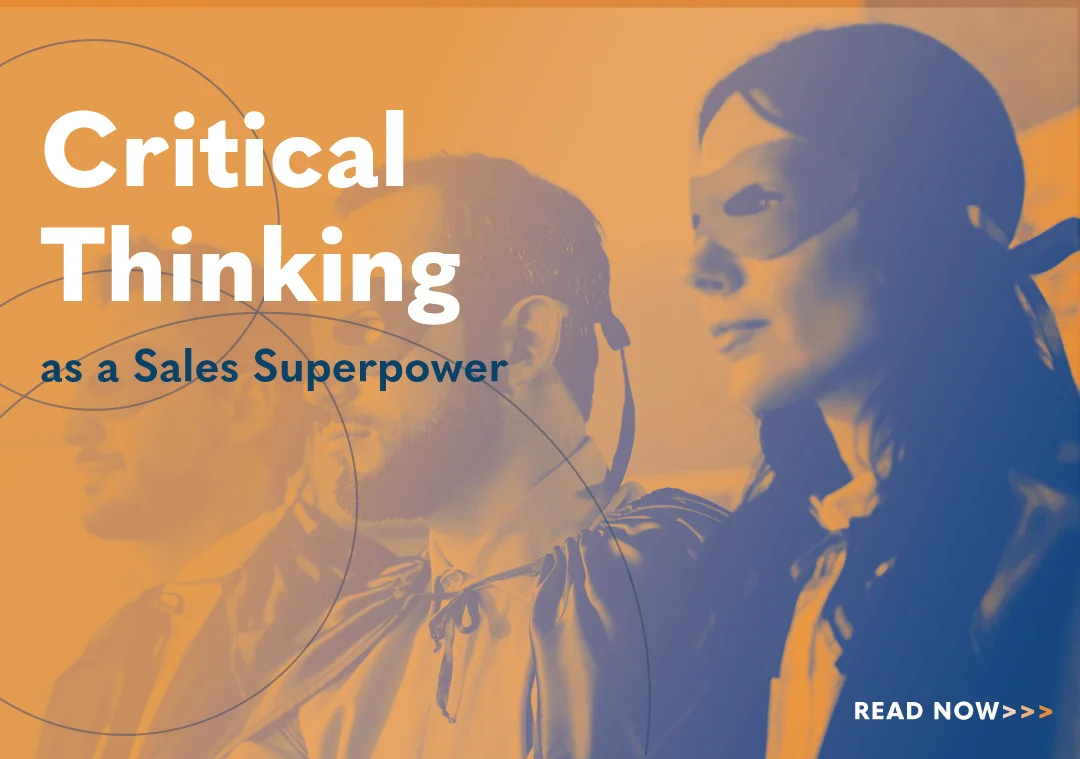How to Conduct a Succesful Win-Loss Analysis

There are many reasons why prospects accept or reject your proposals and bids. Perhaps, it was the economy, or the right product at the wrong time. Maybe it was the price, or your seller couldn’t sway a decision maker.
That’s what makes a win-loss analysis essential. A win/loss analysis is one of the most robust tools you have at the close of a deal. When the dust clears—whether you won someone’s business or not—a win/loss analysis enables you to understand key points of your process and performance during the deal. Top sales organizations conduct these types of analyses as a matter of course. It’s a practice that breaks down the sale (or lack thereof) through mining for data and feedback, instead of relying on emotion and/or the seller’s perception of what precipitated the success or failure.
Why You Should Conduct a Win-Loss Analysis
A well-done win/loss scenario relies on transparency—an open and honest way to understand why an opportunity was won or lost. In short, it’s an assessment from the customer’s point of view that can include interviews and surveys of buyers and decision makers; it’s a strategy for capturing the strengths and weaknesses not only of your sales staff, but of your organization as a whole.
Your analysis should aim to capture the following data from the feedback:
- How did the sales professional or the sales organization as a whole conduct themselves?
- Overall, how competitive are your offerings?
- How competitive is your pricing—how does it stack up against the competition?
- Were your marketing materials and general messaging competitive? How well did those efforts convey to the customer the value of your products and services?
- How well aligned with the customer’s needs is your value proposition?
- How well did you stand out from your competitors?
- In the end, what made the customer choose you—or why did they decide on your competitor?
A common example of a win-loss analysis is when athletes and sports teams often talk about reviewing the game tape. This is a process in which they revisit a game to see why they either won or lost. We think of this similarly in sales. And it’s one of the most important evaluations an organization can conduct. In addition to identifying why they won or lost a deal, it shows how to improve performance for the next game. Let’s examine some tips for conducting a win-loss analysis:
1. Provides You With Valuable Insights in Your Sales Process
According to revenuelm.com, only 42 percent of companies regularly conduct a win-loss analysis. One reason could be the time and effort it takes. When you consider the process, including interviews, questionnaires, and surveys, it can be a lot.
Here, it is important to note a win-loss analysis is not about assigning blame. This would make it a negative process, not only for your sellers. Your buyers too may be hesitant. Instead, a win-loss analysis is an overall evaluation. It can provide your organization with valuable insight into several key areas. These include:
- Sales process
- Buying process
- Competition
- Marketing
- Product development
- Finance
A win-loss analysis can reveal your customer’s perspective of your sales process. For example, it can address how your sales team engaged the prospect. Did they build relationships? Address needs? Did they invest the time required to understand the customer? Most importantly, did the customer feel valued and appreciated?
Another consideration is how well your sales process aligned with the buyer’s journey. Today, the buyer’s journey is increasingly complex. For one thing, buyers are better educated. Also, there are more decision makers. Now, more than ever, it’s incumbent on sellers to match their sales process to the buyer.
In addition, the competition is greater. Educated buyers know their options. Sellers must not only be familiar with their own products and services. They must better understand the competition to differentiate their own. They must clearly demonstrate the features and benefits. And they must show their value over a buyer’s current product or potential replacement.
A win-loss analysis also offers insight into your marketing efforts. This includes effective messaging, accurate buyer personas, and attractive value propositions. It includes the content your sales teams delivered. Was it timely and pertinent? Did it generate interest and help buyers make informed decisions?
A win-loss analysis can show if your products and services meet the needs of your customers. Also, how do they rate your features and benefits? This is critical for your L&D teams and product development.
In addition, price is often a major objection. A win-loss analysis can reveal what buyers thought of your price points in relation to value.
2.Identifies Common Mistakes in Your Organization
The mistakes organizations make when conducting a win-loss analysis often center on the approach. A half-hearted analysis will not yield useful information. Instead, organizations must invest. This means viewing their win-loss analysis as a vital tool in their ongoing assessment.
Additionally, the entire organization should buy-in to the process. This includes the C-suite, sales managers, and sales reps. All should appreciate the value of improving performance and, most importantly, win rates. Some common mistakes include:
- Lacking clear objectives
- Not asking the right questions
Start with a clear set of goals and objectives. Without these, your analysis is a fishing expedition. Consider the things you really want to know. This should include information about your processes, products, and people.
In addition, ask the right questions. This includes documenting the questions and formulating them for maximum effect. For example, avoid closed-ended questions. These can be answered yes or no and might not be useful. Instead, use open-ended questions that invite explanation. Rather than, “Did you find the salesperson helpful?” ask, “Can you describe the salesperson’s helpfulness?”
3. Ensures Accurate Feedback
Accurate feedback is essential. Stronger input yields superior output. Here, consider the following:
- Set up
- Sample size
- Facilitator
Your set up is key. Be forthright. Tell the customer you are conducting a win-loss analysis. You seek the reasons you achieved the sale or missed out. Assure them you want the truth, and their answers will better enable you to meet their future needs.
Sample size is important. Contact the people who can best answer your questions. This is not limited to your seller’s lead contact. It should include key decision makers, like managers, tech specialists, and other VIPs. A small sample size can result in skewed data. A wider net ensures you reach the right people and receive reliable data.
Often, your salesperson is not the best choice to facilitate a win-loss analysis. Of course, their input is important, and they should be part of the process. But they can be too close. Their investment is too great. If you want customers to speak candidly, consider high-level interviews, such as executive to executive. You could also hire an outside vendor to ensure you receive accurate information.

So, What Are the Benefits of Conducting an Effective Win-Loss Analysis:
Following is a list of best practices for conducting effective win-loss analyses:
- Brevity
- Know decision makers
- Standardization
- Ensure an on-going process
- Thank/compensate customers
Keep it short. Your customers are busy. Show them you value their time. Ideally, do not exceed 30 minutes. This is plenty of time to address the biggest issues.
Make sure you talk to a decision maker or someone with a high degree of influence. Remember, you’re asking about buying criteria. You want someone who knows this information and was invested in the process.
Have a standard set of questions. These should be thoughtful and geared to the information you seek. Also, be consistent in your approach. This helps you better understand the data in relation to other customers and deals. Wondering what questions to ask? Here are 7 examples you can use when conducting your next win-loss analysis:
1. What key factor did you base your final decision on?
Be sure to ask this as an open-ended question. Leading by asking something like, “Is X why you made your final decision?” could yield up a “yes” or “no” response, and that’s obviously not going to be very insightful. Getting the client to use their own words will reveal what their perception was of you, your products, and your presentation during the sales process. In addition, the question opens a window onto what’s truly important to the buyer—vs. what you may have perceived was important to them while you were conducting business together.
But be careful not to accept a vague, go-to answer, such as “price.” Because often price has to do with communicating value, meaning that the offering might not have felt like a good fit, or it made it hard to justify the cost.
2. How well-positioned was our solution to meet your needs?
This question is key because it distinguishes you from the competition. It’s likely that there are a number of competitors selling a similar product or service as you, but offering a customized solution is what sets you apart from your competition. If you lost the sale and are conducting a post-mortem, this truly is one of the best questions you can ask while you have the customer’s undivided attention.
3. Describe your experience with our sales professional and/or sales team.
Again, go open-ended to get at the customer’s experience of dealing with your organization’s general knowledge and willingness to help them. You can phrase this question in broader terms, saying something like, “What was your experience dealing with our team?” The customer may have had a number of interactions with folks from your organization—marketers, technical experts, even executives—and asking the question in an all-encompassing way allows them room to talk about those experiences as well.
4. On a scale from 1-10, how much did cost drive your decision-making process?
In asking this quantitative question, you’re helping to solidify that price factored into their decision, and you’ll be able to determine how competitive or off-target your pricing is.
5. What was your decision-making process like?
The sales process can get pretty complex, and often what you’ve dealt with is not a single client as decision maker, but many stakeholders who also weighed in on the question: to buy, or not to buy? By asking this question you’re determining who at Company X was in support of your product and who was skeptical about it. For example, when it comes to selling a CRM solution, needs vary depending on the stakeholder: Marketing will want a CRM that integrates with their marketing automation tool, a sales rep will want it for usability, and a director of sales will need reporting capabilities that are easy to set up.
6. What did you like about our solution, and what did you dislike?
When a sale goes south, oftentimes it’s the sales rep who gets blamed. But there is always more to the story and the answer(s) to this question can provide additional insight into what went wrong. For example, your sales rep might have nailed the presentation, it was just that the competitor’s product was better positioned to meet the client’s needs.
7. What prompted you to decide—or decide not—to buy at this time?
The response to this last question could shed light on that outcome most sales people live in dread of—the no decision. Typically what you’ll uncover is that you, the seller, failed to provide or convey the value during the sales process, or you’ll find that in fact you were not connected to the key decision makers. Either way, there’s something to learn here. And chances are, whatever you learn from asking this, and the questions above, you will go into the next sales process better equipped to get to yes. Not to mention you’ll build your reputation as a thoughtful sales rep.
A win-loss analysis should be an ongoing process, not a one-time event. High-performing sales organizations know the value of regular customer feedback. This ensures your sales team consistently meets and exceeds customer expectations.
In addition, thank your customers for their time. This can be as simple as a follow-up email, small gift, or other compensation. Be generous. After all, customer feedback is vital to improving your business. Also, today’s lost deal can return as tomorrow’s best customer.
Use Technology Available To You To Get More Insights from Your Customers
Interviews are the best way to get the information you need. Open-ended questions allow customers to go deeper in their responses. However, many organizations supplement their interviews with technology. Consider the following:
- Questionnaires and surveys
- Segmentation/demographics
Questionnaires and surveys can reach a wider audience and reveal more specific, quantitative information. Types of surveys vary from simple “Yeses” or “Noes” to a dichotomous, two-point scale of opposites or more complex Likert scales. Today, there are many tools and software that can help.
In addition, surveys can segment the data across groups. Consider the demographics. There may be differences between customer size, location, buyer type, and even competitors. Often, a customer’s perception of your organization will change based on the competition. You might have been number one against some but number three against others. This can improve your process and pitch.
Clozd research revealed B2B decision makers are more likely to participate in interviews (30 percent of the time) over surveys (5 percent). This is even though interviews require more time than surveys.
For sales organizations, success is never a zero-sum game. It’s not only based on whether you closed the deal. Sure, closed deals are better than lost ones. But in both cases, the reasons are important. For one thing, real success is based on consistency. To sustain growth, you must know what worked and what didn’t. And you must be willing to make the changes needed to improve. We hope this helps your organization conduct productive win-loss analyses to better serve customers and close more deals.
Last Updated 12/19/2024
- Why You Should Conduct a Win-Loss Analysis
- 1. Provides You With Valuable Insights in Your Sales Process
- 2.Identifies Common Mistakes in Your Organization
- 3. Ensures Accurate Feedback
- So, What Are the Benefits of Conducting an Effective Win-Loss Analysis:
- 1. What key factor did you base your final decision on?
- 2. How well-positioned was our solution to meet your needs?
- 3. Describe your experience with our sales professional and/or sales team.
- 4. On a scale from 1-10, how much did cost drive your decision-making process?
- 5. What was your decision-making process like?
- 6. What did you like about our solution, and what did you dislike?
- 7. What prompted you to decide—or decide not—to buy at this time?
- Use Technology Available To You To Get More Insights from Your Customers

- Account Planning (11)
- Awards (53)
- Client Testimonial (37)
- Personal Branding (19)
- Podcast (12)
- Research (70)
- Sales Career Development (85)
- Sales Coaching (156)
- Sales Consulting (133)
- Sales Culture (164)
- Sales Enablement (349)
- Sales Leadership (111)
- Sales Management (243)
- Sales Negotiation (16)
- Sales Prospecting (120)
- Sales Role-Playing (19)
- Sales Training (234)
- Selling Strategies (256)
- Soft Skills (68)
- Talent Management (92)
- Trusted Advisor (28)
- Virtual Selling (42)
- Webinar (12)































